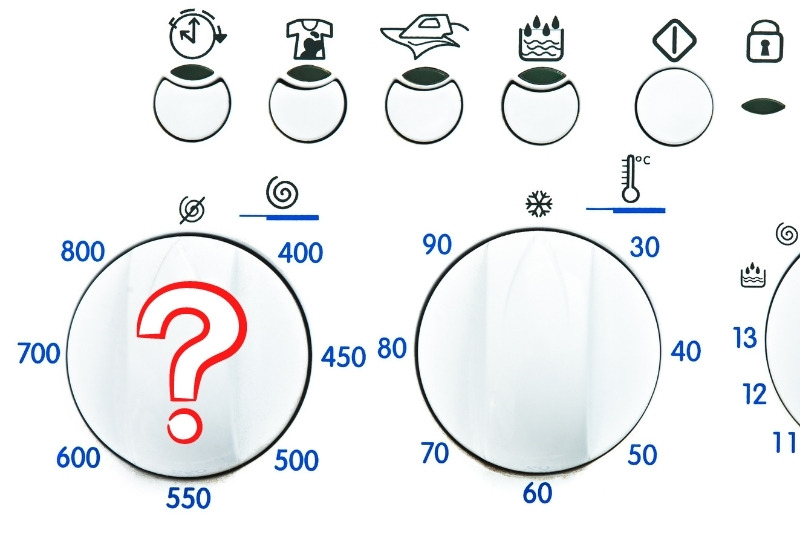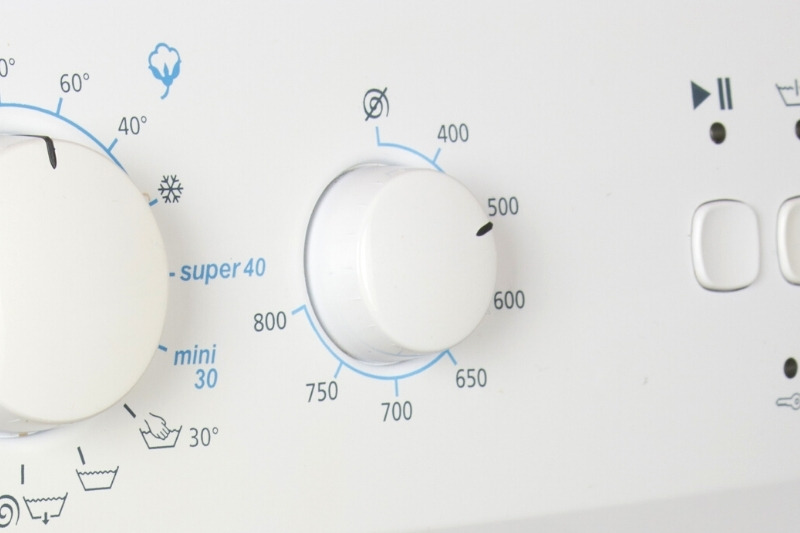Washing machines provide a quick and easy way to wash your clothes. However, with such a wide variety of wash cycles and special functions available on today’s washing machines, it can be overwhelming to know which settings to use.
One of the settings that many people need clarification on is spin speed. Although washing machines will adjust this speed based on your chosen washing cycle, you can also alter this setting yourself based on your needs and the type of laundry you’re washing.
But what’s the lowest spin speed on a washing machine? Is a low spin better for clothes? And how should you adjust the speed based on the fabrics you’re washing? Read on to find out!
What Is Spin Speed?

Spin speed refers to how fast your washing machine drum rotates during a spin cycle. It is measured in revolutions per minute (rpm). For example, 1200 rpm means that the drum rotates 1200 times every minute during the spin cycle.
The lowest spin speed on a washing machine is typically 400 rpm, although this can also vary depending on the brand and model of your machine. For example, Beko washing machines have their lowest spin speed set at 600 rpm. Check your appliance instruction manual for more clarification.
Low spins speeds of 400-600 rpm can be effective, but some more durable fabrics will need a higher spin speed in order to remove a good amount of water.
On the other end of the spectrum, the highest spin speed on a washing machine is 1600 rpm. However, speeds this high are more commonly found on high-end models, so a more budget-friendly washer is likely to have spin speeds of up to 1200-1400 rpm instead.
Is a Low Spin Better for Clothes?

Your washing machine will reach your chosen spin speed during its spin cycle. Depending on your washer’s settings, this cycle can last anywhere between 2-12 minutes.
In many cases, a high spin speed during this time is highly beneficial as it increases the centrifugal force in the machine, extracting more water from your clothing and speeding up the drying process.
However, there are some benefits of using a slower spin speed:
- Extended clothing life: Lower spin speeds are generally gentler on fabrics, extending the life of your garments. For example, the increased force within the drum during a high-speed spin cycle can cause some materials to become stretched and misshapen.
- Clothes are less prone to damage: Using a lower spin speed also reduces the amount of friction between the fabrics in your machine. This lessens the chance of your clothes becoming tangled and worn (making them more prone to tearing) and stops the formation of bobbles on the fabric’s surface.
- Fewer creases: High spin speeds can cause your laundry to come out of the machine creased. This means a lower spin speed will be more beneficial when washing items such as shirts or blouses that need to be ironed before they are worn.
What Spin Speed Should I Use?

When you select a wash cycle on your machine, the appliance will automatically choose a spin speed for you. In most cases, this pre-programmed speed is around 1200-1400 rpm.
Although you can stick with the pre-programmed speed setting, you can also manually adjust the spin speed based on the items you are laundering.
In general, the following spin speeds should be used when washing these fabrics:
- Wool: Lower spin speeds of 600 to 800 rpm are best when washing wool to prevent unwanted shrinking or felting.
- Cotton: Clothing made from cotton requires much agitation, so a high spin speed of 1400 rpm is typically recommended.
- Denim: A spin speed of at least 800 to 1000 rpm is required to ensure excess water is not left in the material.
- Synthetics: 800 to 1000 rpm is also ideal for synthetic materials as it will remove most of the water without the risk of damage.
- Delicates: For delicate fabrics (e.g., silk), you need to use the lowest possible speed setting on your machine to prevent damage from occurring.

Hannah has a passion for cleaning. She worked her way around Australia by cleaning hostels in exchange for free accommodation and used her cleaning skills to bag a job as a chalet host for a luxury ski company in France.






